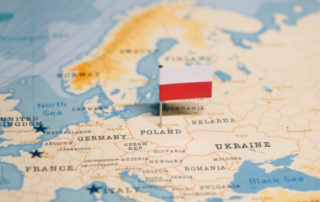The Vice President of the United States Kamala Harris visited Ghana, Tanzania, and Zambia in 2023. That move was part of the U.S. foreign policy strategy to remind African countries that the U.S. is willing to trade and continue the relations. It also meant to counter China’s increasingly extensive reach over the continent. There is an anxious feeling among American officials that the U.S. lost ground to China in the region in the past decades. China also built a military base in Djibouti six years ago near Africa's only US base, in an unmistakably provocative step.
Over two decades ago, China set out to access valuable mineral resources and began investing expansively across the region as a part of its “Go Out” or Going Global strategy, which started in 1999. The following year, China entered an official partnership with 44 African countries at a Forum on China-Africa Cooperation (FOCAC). Today, China is Africa’s biggest trading partner, worth over two hundred billion dollars, according to the Brookings Institute. The Chinese Loans to Africa Database shows that China’s banks lent over 160 billion dollars to African countries in the past twenty years.
The economic ties and, some would say, dependence on China resulted in shifted international alignments. A significant number of African countries back China’s actions in the South China Sea and China’s treatment, condemned by the UN Human Rights Council, of its Muslim minorities. It is not coincidental that China also built or invested in renovating numerous African presidential and foreign offices. The influence also extends to soft power. For example, China launched the Sino-African Political Party Leaders program sponsored by African politicians. The Chinese government also invests in African youth’s education, including building schools, providing scholarships, and providing vocational training. Chinese companies employ and provide apprentice programs to the local population.
China’s Belt and Road Initiative (BRI), first proposed by President Xi Jinping in 2013, has brought visible infrastructure change in African countries. The multi-billion project spans three continents, recreating numerous routes of the former Silk Road. According to the Committee on Foreign Affairs, over ten thousand Chinese businesses operate in Africa, amounting to three hundred billion-dollar investments. The Initiative focuses on energy, construction, transport, technology, and public utilities. Most African countries participating in the BRI are located along the coast, boosting China’s control over the maritime paths and increasing its economic bargaining power. The newly built railways now connect ports to the inland, allowing more accessible transport of raw materials to the seaports.
However, as China tries to navigate the slow recovery since the pandemic and the real estate crisis, its involvement in Africa is less robust than before. This will be a crucial development in late 2023 and 2024. It will be interesting to see if planned investment levels continue across the continent. For US businesses conducting geopolitical risk assessments and on the ground due diligence investigations locally and regionally will be essential to avoid risks that will likely develop.
Security concerns already exist, as China provided numerous cities and villages with intelligence and surveillance technology. According to the Africa Center, over three thousand former Chinese military staff are working on the BRI, supporting the concern for foreign and corporate espionage.
Furthermore, the war in Ukraine resulted in food shortages in the region, worsening food insecurity amidst some of the worst droughts. As a result, food and fuel prices skyrocketed. According to the United Nations, over five hundred thousand children are at risk of famine in Somalia alone. The World Bank reports that over sixty percent of Africans experience food insecurity. The climate change impact on the continent and conflicts led to millions of displaced people. The violence is especially prevalent in the Sahel region, which has experienced much instability.
Despite numerous challenges, Africa’s annual economic growth averages around 4%. Foreign direct investment rebounded nicely after the pandemic, reaching a record eighty-three billion dollars in 2021, according to the World Investment Report 2022.
China’s influence in Africa will undoubtedly be felt by many companies doing business in the region through changes in historical trade relationships, pricing, and access to specific resources. As mentioned above, monitoring the level of investment flowing into Africa from China from late 2023 through 2024 will be critical in anticipating what the market will look like in the next five years.
In addition, there is a heightened cybersecurity risk in the continent stemming from the presence of certain Chinese-based technology companies such as Huawei. Companies should examine their cybersecurity policies to ensure heightened risks are accounted for.
More generally, doing business in Africa also requires a robust compliance plan that includes conducting due diligence investigations on new regional partners based on the increased corruption and bribery risks.
China has recently invested significantly across the African continent. This has established closer ties between China and certain African nations. Chinese companies’ infrastructure projects in Africa extend China’s soft power expansion plan.
As China hits more uncertain economic conditions, the country’s influence in Africa may wane if investment decreases.



